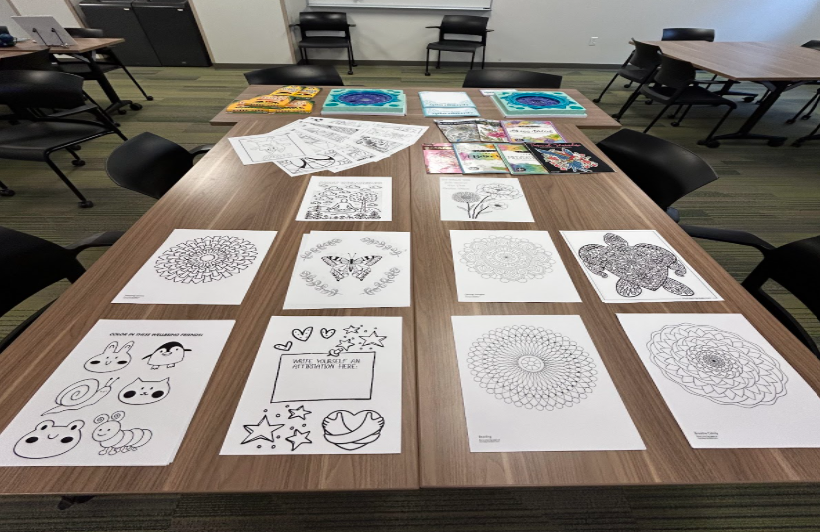Last semester the Green Fund was implemented at NMU, comprising an optional $5 fee for students who are taking six or more credits. This money goes to EcoReps, an organization that promotes sustainability at NMU and in the community.
EcoReps encourages sustainability in many areas of life, not only the environment. Rachel Lefor is a junior majoring in environmental studies and sustainability. As an outreach intern with EcoReps, her job is to interact with the campus community. In addition to environmental sustainability, Lefor says EcoReps advocates for social and economic sustainability. Last year, the organization published a couple of videos on YouTube, Lefor says the videos serve as good examples of EcoReps’ goals outside of the university.
“We went out into the Marquette community and interviewed local businesses,” Lefor said. “We were trying to get them involved and promote their business and see how they operate sustainably too.”
EcoReps is a national model that can be found in some variety at multiple universities. NMU EcoReps was founded in 2017 by two students, Georgia Harrison and Olivia Walcott. Both students have since graduated, but during their time at NMU they were instrumental in establishing EcoReps and securing funding for the organization.
Jes Thompson is a professor at the college of business and has served as the faculty advisor for EcoReps since Fall 2019. Thompson explained how Harrison and Walcott were inspired to bring the EcoReps model to NMU. In Fall 2017, they attended a national conference hosted by the Association for the Advancement of Sustainability in Higher Education.
“They went to this conference and they came back all fired up about this program that they heard about called EcoReps,” Thompson said.
Harrison and Walcott brought the idea to NMU’s Sustainability Advisory Council, where it was met with great enthusiasm. NMU EcoReps was established in 2018. They were given a little money to fund their projects, but the students soon decided it wasn’t enough.
Harrison and Walcott recruited about a dozen of their peers to sign up for two to three-minute speaking slots at an upcoming meeting of the Board of Trustees. The students coordinated a speech and took turns presenting to the board. They hoped their presentation would convince the board to grant them the money they needed. Thompson says the speech was eloquent, and the board thought so, too. As the students were leaving, one of the board members stopped Harrison and asked how much money EcoReps needed immediately. Harrison responded without hesitation. They needed $20,000 per year. Then, the students left.
“The next thing they know they get a note from the Board of Trustees saying, ‘we’re going to give the EcoReps $20,000 for two years, so here’s an account with $40,000 in it. Prove that you can make a difference,’” Thompson said.
At the end of the two years, the board revisited the idea, and the Green Fund was officially established in Fall 2020. EcoReps would usually use the money to fund a variety of projects and campus activities. The pandemic hindered many of their plans, but the organization is beginning to bounce back in the winter semester.
The executive director of EcoReps is Heather Vivian, a senior majoring in communications studies with a double minor in environmental studies and sustainability. Vivian hopes to collaborate with other student organizations to host events this semester.
“This year our EcoReps team has been working hard to get student input to see what sustainable initiatives they want to see on campus, as well as getting proposals written to get these ideas implemented,” Vivian said. “We are also currently working with other student organizations to put on events during Earth Week in April.”
The Green Fund is a boon for EcoReps, and they hope the community will make use of it as well.
“We really want to invite students, if they have a really wonderful idea, to type up a proposal, which you can find online at the EcoReps page on Sustainable NMU,” Lefor said.
Lefor says EcoReps reviews each proposal and chooses which ones to submit to the Sustainability Advisory Council for a final decision.
Student engagement is important to EcoReps. Vivian hopes engagement will continue to grow.
“My hope for this program is that it will continue to be a resource for students to learn more about sustainability, get involved on campus and help create a greener future for Northern,” Vivian said. “Now that the Green Fund has been approved, I hope that this program can help students voice what sustainable changes they want to be made on campus and work to get them implemented.”
For more information, or to get involved with EcoReps, email ecoreps@nmu.edu.


























